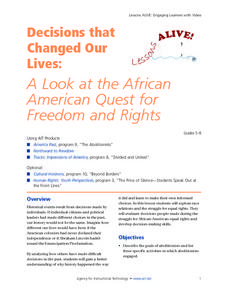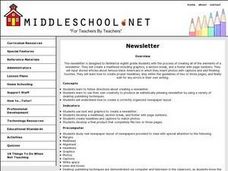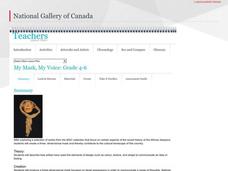C3 Teachers
Uncle Tom’s Cabin: Can Words Lead to War?
"Words, words, words." Despite Hamlet's opinion, words can be significant. In this inquiry lesson, middle schoolers learn how the words in Harriet Beecher Stowe's Uncle Tom's Cabin, in the view of many, lead to the American Civil War. To...
Curated OER
Black History: Celebrities
In these Black history worksheets, students learn about important African American people. Students trace the people's names and then bubble in the correct descriptions for each person.
Curated OER
Diverse Voices-African American Ventures
Students research African-American participation in the Civil War. In this Civil War lesson, students read the article "Fighting Rebels with Only One Hand" and write a persuasive paragraph on whether the participation of the...
Curated OER
African American Scavenger Hunt
In this African American music history worksheet, students research the history of African American music. Students then answer the fifteen questions.
Curated OER
African American Influence on History
Third graders create a Hyperstudio report on an African-American individual who has had an effect on American History. They use a fact sheet and concept web that they created during previous lessons to produce the report and use the...
Curated OER
Decisions That Changed Our Lives: A Look At the African American Quest for Freedom and Rights
Students are introduced to the goals of abolitionists throughout history. In groups, they use the internet to discover the purpose of the Underground Railroad and why there were bus boycotts in the 1960s. They compare and contrast the...
Curated OER
Black History Month
Students work in cooperative pairs to research information and give oral presentations about African American men and women who have made significant contributions to U.S. history.
Curated OER
Black History Month Newsletter
Young scholars become familiar with the process of creating all of the elements of a newsletter. They input stored articles about famous black Americans in which they insert photos with captions and add finishing touches.
Curated OER
United States Colored Troops in Missouri: Finding African American History at the M
Students analyze primary source documents about African American soldiers in Missouri. They work together to complete a worksheet about the document. They discuss the information they gathered as a class.
Curated OER
Carter G. Woodson: Father of Black History Month
Young scholars explore the life and accomplishments of Carter G. Woodson, the father of black history. They read and discuss his educational pursuits and discover he was the second black man in history to receive a doctor's degree....
Polk Bros Foundation
Topic Report Learning Organizer
If you'd like to quickly access a simple graphic organizer designed for a class to divide and conquer a larger subject, then check out this resource. Assign class members to study a specific topic within a historical theme or event, and...
Curated OER
African American Literature in Art
Learners compare art and literature by examining a contemporary painting by Glenn Ligon and the essay by James Baldwin that inspired it. They write an essay about a personal experience that relates to the theme of being an "outsider."
Gilder Lehrman Institute of American History
Slave Narratives: Frederick Douglass, Harriet Jacobs, and the Columbian Orator
Young historians practice in-depth, quality analysis of primary source texts in this three-lesson unit, which examines excerpts from the slave narratives of Frederick Douglass, Harriet Jacobs, and Caleb Bingham.
Atlanta History Center
Civil Disobedience and the Atlanta Student Movement
What tactics are used in civil disobedience? Learners study the conditions in Alabama that led to the establishment of the Atlanta Student Movement, as well as consider the nature and effectiveness of civil disobedience.
Facing History and Ourselves
After Charlottesville: Public Memory and the Contested Meaning of Monuments
Are Civil War monuments a kind remembrance or a reminder of a dark past? The lesson focuses on the public's memory of the Civil War and the monuments that represent it. Young academics explore past efforts to change historical symbols...
Teaching Tolerance
Mass Incarceration as a Form of Racialized Social Control
Mass incarceration: A result of a tough stance on crime or racial discrimination, you decide. Academics explore the history and reasons behind mass incarcerations in the United States and its impact on ethnic communities. The...
Center for History Education
Freedom for All? The Contradictions of Slavery and Freedom in the Maryland Constitution
Freedom for the few! An interesting lesson focuses on the Maryland Constitution and its lack of freedom for African Americans. Scholars examine the premise of freedom for all—which only extended to a limited few. Academics complete...
Teaching Tolerance
Parallels Between Mass Incarceration and Jim Crow
Is history repeating itself? A riveting lesson examines the parallels between mass incarceration in the U.S. and the Jim Crow Laws of the past. Academics review Jim Crow Laws and compare them to mass incarcerations of African Americans....
Teaching Tolerance
Understanding the Prison Label
Break the chain. An engaging lesson examines why it is so hard to break free of the prison system in the US. Academics participate in a reader's theater, read primary sources, and discuss their thoughts. The lesson explains the hardships...
Smithsonian Institution
Separate is Not Equal: Fight for Desegregation
Separate is not equal! An eye-opening lesson delves into the past to understand the fight for desegregation and how it impacted African American communities. Academics complete two one-hour lessons using documents, photographs, and...
Smithsonian Institution
Resistance to School Desegregation: The Boston Busing Crisis
Despite how it sounds, Boston's busing crisis wasn't a transportation problem. Academics address the problems faced by African Americans following school desegregation and the struggle to receive equal educational opportunities. Scholars...
National Gallery of Canada
My Mask, My Voice
Recognize Black History Month with an examination of the African diaspora and a hands-on mask-making project. Learners first view and discuss images of artwork before creating their own plaster masks.
Teaching Tolerance
Jim Crow as a Form of Racialized Social Control
Just because slavery was illegal doesn't mean it went away ... Jim Crow Laws took its place. An eye-opening lesson focuses on how Jim Crow Laws were used as a form of racial social control against African Americans in the United States....
Teaching Tolerance
The War on Drugs—Mechanisms and Effects
The war on drugs doesn't have definite results. An interesting lesson plan examines the social, political, and economic effect of the war on drugs. Academics learn how the war on drugs has led to mass incarcerations and negatively...

























